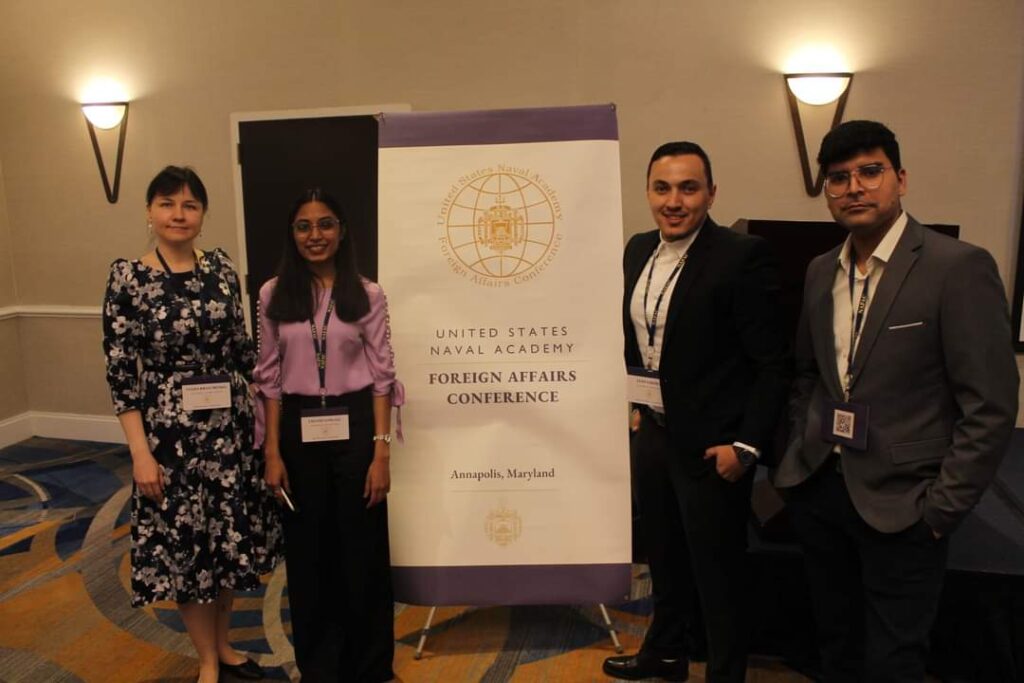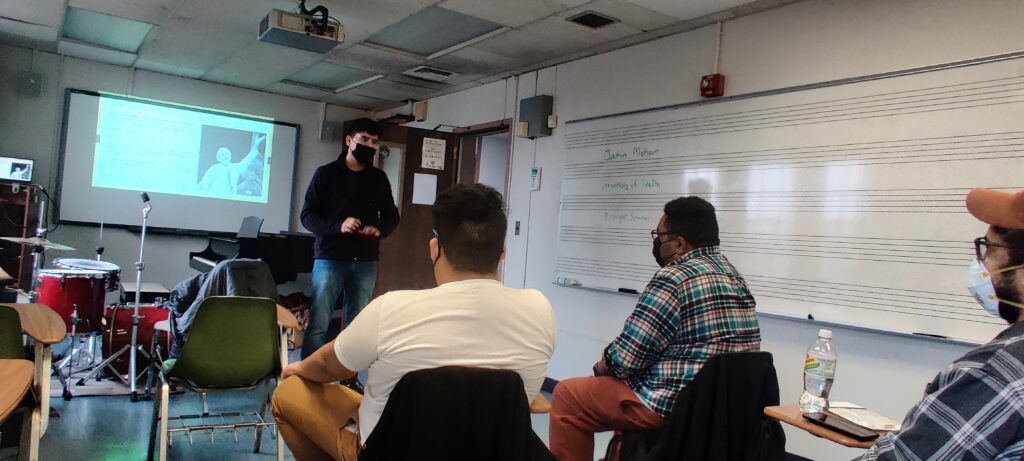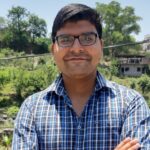
Every year, Fulbright provides over 850 awards for students to study or conduct research in over 130 countries. One such award is the Fulbright-Nehru Postdoctoral Research Fellowship, specifically designed for early-career researchers from India to conduct research in the United States. Fulbright-Nehru Scholars typically spend 8 to 24 months at a host university in the United States researching various fields such as STEM, the arts, economics, law, and the humanities.
Dr. Jatin Mohan is a musicologist and music professor from India who specializes in analyzing both Indian and Western classical music. He won a Fulbright-Nehru Scholar award and spent the 2021-22 academic year at the Graduate Center, City University of New York, researching the theory of “microtonality” in Indian and Western classical music. We spoke to him recently to ask about his experience, what led him to apply to Fulbright, and what advice he would give to potential future Scholars.
Can you tell us about your background and what interested you in a career in music and conducting music research?
I come from a non-musical middle-class Indian family, where – similar to most middle-class Indian families – music and any other art are generally criticized based on financial insecurity, as these career paths do not guarantee economic success as a fields such as engineering and medicine would (this is a primary reason why India has so many engineers and doctors). However, I have always been a misfit in Indian society; I was always a sort of introverted, oversensitive, dreamland young kid who found it difficult to make consensus with the outside world. And I believe that place of solitude, oversensitivity, and rage within me pushed me towards pursuing a music career.
As I mentioned, having my family’s agreement to pursue a music career was always difficult. It was a long and hard struggle, augmented by the fact that I was never a talented musician. I could not make it to pursue my undergraduate degree in music at the University of Delhi – one of the most elite universities in India. However, I have always been able to complement my lack of extraordinary talent with discipline and hard work. I came again the next year, and somehow, I made it to the University of Delhi.
I love the music department of the University of Delhi more than most places in the world. It is filled with utterly smart people. However, I also need to add that it is also really competitive. It is a severely hierarchical place where your competency in music will decide how you will be socially treated. It made me super competitive, hardworking, and a little bit insecure, too. My undergraduate and postgraduate years were like five years passed in a flash. I was utterly disciplined: getting up early, practicing for 2 hours, leaving for university, returning home at 5, sleeping for an hour, and practicing for 2 to 3 hours again. After following this strict routine for five years, I realized I was not entirely cut out to be a musician; I always had an overactive brain that used to analyse everything around me. That led me to pursue my Ph.D.
As part of my Ph.D., I won the All India Junior Research Fellowship, and I can’t stress enough how much a steady flow of income helps in pursuing research. As a music researcher, I have mainly analyzed critical musicological questions, which are mostly at the intersection of the theory and practice of different music. I have always understood musical research as a way of painting a picture without any colors. Dissimilar to most other scientific research areas, music analysis, specifically in Indian music, does not have established research methodologies. Every musical question requires deep introspection, and you probably need to create your colors (methodologies) and paint your picture, which might change its shape a billion times.
In short, my “misfitness” led me to pursue a career in music, and my “over-analytical” brain pushed me to pursue music research. It has been a bumpy road so far, but it has been full of unexpected and wonderful surprises, and Fulbright was one of them.
What is the story behind applying for a Fulbright Scholar Award? What led you to the opportunity?
To the greatest extent, I owe my Fulbright journey to another Fulbright scholar, Professor David Claman. Professor Claman visited the University of Delhi’s music department in 2018. He was the one who looked at my research and advised that I really should apply for a Fulbright scholarship. He monitored every part of my application, read my documents a hundred times, and contacted many potential host universities in the US. I applied in 2019 as well, and I got rejected, but he motivated me to apply for it again, and fortunately, I made it for 2021.
Another person I dearly need to thank is Professor Norman Carey, executive director of the music department at Graduate Center CUNY. He was my Fulbright advisor, and he was always very generous with time, both before and during my Fulbright journey. Before my Fulbright selection interview, he spent at least 2 hours every week working on my project, and in the interview, it turned out to be the smoking gun in deciding the fate of my application.
I also need to thank my PhD supervisor, Professor Rajpal Singh. His letter and guidance were critical in shaping a clear research plan.
If not for any of these three, I would not have made it to this magnificent opportunity. All three are shining lights of my life, and I will always cherish their support.

What was your time like as a Fulbright Scholar? What were your projects?
As a Fulbright scholar in New York City, I became part of a large community of Fulbrighters worldwide. It was a magical experience where I witnessed the disappearance of all sorts of social, geographical, and financial boundaries among a diverse community of Fulbrighters and the development of a strong sense of global citizenry.
As a Fulbright scholar, I studied and investigated a musical practice known as “microtonality” and how it is conceptualized and utilized by Western and Hindustani musicians. It is a sort of a very narrow niche, which generally interests people interested in the mathematical analysis of musical scales, known as scale theory. However, I also analyzed this issue from a perspective of musical practices and investigated it with the framework of music analysis, which is not necessarily connected to scale theory.
However, in all honesty, pursuing my research was not the most exciting part of my journey. I enjoyed the international exposure more than anything else, and the opportunities came to me, and I created through it. During my Fulbright tenure, I was affiliated with a not-for-profit organization called One To World. One To World organizes cultural events, particularly for international and Fulbright students in New York City, and I attended almost all of them. In India, I was always sort of a “maybe” man; in New York City, I suddenly became a “Yes” man. I said yes to all of their events. I was excited every day as I knew that today I would be meeting somebody new from a different part of the world through their events. And they also really appreciated my attendance at their events. At their fundraising dinner, they made me one of their cultural ambassadors, and I delivered a speech sharing my story with an auspicious audience of 300 people, including American businessmen, senators, and scholars. If I get the chance, I would love to contribute to their cause and work for them.
In addition, I had the unique opportunity to be selected to represent India at the Naval Academy of Foreign Affairs (NAFAC) 2022 as a delegate. In NAFAC, I met American midshipmen, admirals, political figures nationwide, and international diplomats worldwide. Among the usual issues, I emphasized cultural and educational diplomacy over other forms of diplomacy. I will forever cherish these experiences.
Fulbright was my crown achievement, and everything I will achieve from now on, both professionally and personally, will be directly and indirectly connected to it.
How did you enjoy your time in New York?
Oh, my New York, my lovely New York. There is no other city like this. I have always seen New York as a country within a country. A country with no nationality and one which is always keen to push its socio-cultural boundaries. There is nothing -except the rent- which I did not enjoy about NYC. If you want food from an “x” country, you will have first-generation immigrants making authentic food from that country. No other city has this international and multicultural environment established into its very fabric.
I enjoyed the multiculturalism of New York City to the greatest extent. As a music student, I attended concerts in all iconic musical venues in New York, such as the Metropolitan Opera House, Alice Tully Hall, etc. I also attended musical concerts of Arabic music, Turkish music, jazz, blues, rock, etc. I was surprised to find a very active society of Indian musicians in Brooklyn. In addition, I can never discount One To World and its events in different parts of NYC. I particularly remember one event where we went for a walk in Manhattan about the contribution of African Americans in building New York City. The socio-cultural richness of NYC never failed to astonish me.
Honestly, my Fulbright experience would have been different if I had gone elsewhere. [New York] is indeed a huge melting pot, and I am very fortunate that I was part of it. And if I would get the chance, I would love to live in it again.

What were some key takeaways and highlights from your Fulbright experience?
Well, there are many, but three are the most valuable. First, I realized about the sheer size of the world we live in. I always found it astonishing that we all grow up in an ethnocentric bubble with specific interpretations of our realities, and more often than not, they become a central part of social identity. The moment we leave that bubble, we find so many others living in similar bubbles, having entirely different interpretations challenging our mere social existence. Fulbright challenged me to a great extent. Every conversation with every Fulbrighter provided me with a new perspective on something; I was confident that my perspective was the most righteous one and was unshakeable. Earlier, I was built off of learning; now, I’m built off of experiences, with each experience off-shooting into many interpretations with an eagerness to take new paths.
The second takeaway is the value of open conversations. During my Fulbright, more than anything, I learned from innumerable conversations I had with other Fulbrighters and international students in the USA. I figured out that conversations, known as संवाद in Hindi, is a critical factor in professional and personal growth. It takes people from “I” to “us.” My Fulbright experience is colored with many open conversations, even about the most challenging issues. I particularly remember having a conversation about Algerian colonialism with an Algerian historian. I never knew about the French atrocities in Algeria, which, as research has suggested, had more long-term severe damage than British colonies (not that the British were especially kind themselves). Now, whenever I think about European colonialism, I neither think solely about the Indian subcontinent nor solely about the British.
The third takeaway concerns the value of traveling and leaving your comfort zone. After Fulbright, I realized that everybody needs to leave their cocoon and barge on a journey of self-exploration. As I said, once you go on this journey and have those open conversations, you start to outgrow your cocoon, and the more often you do it, the more you will grow. And I believe these journeys convert an achiever into a leader. I’ll always make sure I pass on these takeaways to other students.
How have you applied what you learned as a Fulbrighter professionally? How did the opportunity help you grow?
During my tenure as a Fulbrighter, I learned the basic and advanced methodologies used in scale theory. I used them to analyze the music of Western microtonal composers. In addition, I interviewed many experimental Western musicians and tried to understand the thought process behind their compositions. All of this was a big chunk of my PhD thesis. Currently, I am working on converting one of the chapters of my thesis, which is about analyzing the nuance and practice of microtonality in Hindustani music, into a paper. In this particular chapter, I investigated the manifestation of microtonality in Hindustani music through a novel methodology, which is a combination of tools of scale theory, standard music analysis, and basic ethnography. As a result of my investigation, I found a nexus of ever-evolving musical nuances constituting the role of microtonality in HIndustani music.
In addition, as a Fulbright Nehru Scholar, I also attended an eight-week course about field methods in ethnomusicology. It motivated me to pursue a lengthy future project for my postdoctoral study. As part of my postdoc, I want to perform case studies of the music departments of three major government-funded universities in the Delhi-NCR region (Delhi National Capital Region). Through my intended project, I want to investigate music students’ social and cultural impact on the larger spectrum of post-colonial, middle-income, and financially conservative North Indian society to design an ever-evolving music education curriculum that focuses on the employability of music students.
Most Indian music institutes primarily function as music conservatories; their prime objective is to train and cultivate the next generation of Indian classical musicians. Unlike Western universities, they don’t provide degrees in different aspects of music, such as ethnomusicology, music therapy, music technology, etc. This one-directional education inculcates students with limited skills, reduces their employability, and produces graduates with lower social and financial status. This all seeps into the pre-existing societal stigma in India that music as a career path is financially volatile and must be avoided, thus limiting music’s societal involvement.
Throughout this project, I will investigate multiple aspects of these students’ social and financial struggles and conduct an ethnographic study of the functioning of these departments. Based on ethnographic data, I will design a curriculum that focuses upon the needs of the ever-changing job market, equally focuses on academic research and the training of students with different research methods, and also design a required path to achieve these objectives through optimal utilization of the available resources.
I am currently in touch with my professors at CUNY to be able to aptly present this project through an application for pursuing Post Doc.

You recently became a university music professor! With your Fulbright experience, what impact have you made so far in your new position?
At my new job at IILM University, I am the only music professor. Fulbright played a key role in my interview. It is probably the key reason behind my hiring. I am working as an assistant professor and currently teaching music elective courses; however, I’ll not limit myself to them only. The university is looking to grow, actively collaborating with foreign universities and inviting foreign scholars. Given my vast network, I’ll bombard the university with collaboration with foreign universities in the coming month and invite as many music scholars as possible. In addition, I’ll soon be giving a workshop about the intricacies of a successful Fulbright application at IILM University as well.
In addition, I am designing multiple courses focusing on interdisciplinary musicological research. As an assistant professor, I aim to foster an appreciation of music and musicological research by emphasizing music’s cognitive and socio-cultural benefits and the transferable skills music offers for learning other subjects in my lectures and courses. In addition, I will recognize potential scholars and train them to apply for applying for highly competitive scholarships such as Fulbright.
And finally, could you provide any advice for others who want to win a Fulbright award?
Well, there are three essential pieces of advice I have. The first is to start on your application as early as possible. It is a long and complicated application; from research statements to recommendation letters, all will require ample critical thinking and continuous evaluation. Therefore, it is better to start a year before the application deadline.
Secondly, some categories of Fulbright might require you to contact a few professors to find a Fulbright supervisor. Be smart with it. Before sending an email to a professor, read their work, connect it with your project, and contextualize it, proving why they are the right person for your project. It also shows that you are genuinely interested in their work. It requires more time, but in my experience, you will get a reply 9 out of 10 times.
Finally, I would appreciate aspiring applicants to find outside help for their application. It is very easy to find contact information of previous Fulbright scholars, and nobody should be shy to contact them. Contact them and respectfully ask for their opinion about your Fulbright application. It is much more productive than doing this alone, exponentially increasing your chances.
Interested in applying to this fellowship? Bookmark the Fulbright-Nehru Postdoctoral Research Fellowship to your ProFellow account.

© 2024 ProFellow, LLC. All rights reserved.